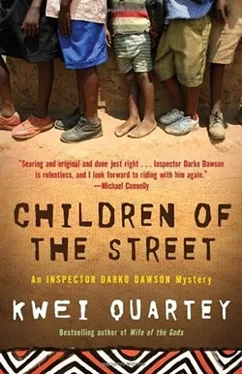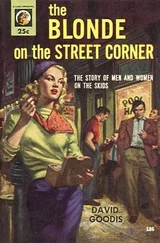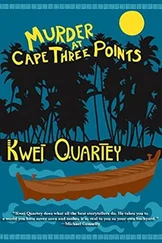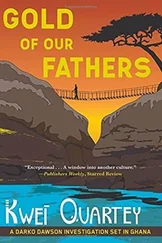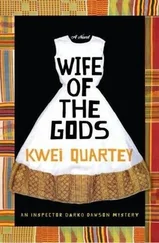“Morning, Chikata.”
They shared a large, open office with nine other detectives ranging in rank from constable to inspector. When Dawson got to be chief inspector, he would move to a more exclusive room somewhere. For now, this old and bare room on the seventh floor of the CID building was the home base Dawson and his colleagues loved to hate. The air-conditioning consisted of louvered windows, which on one side of the room provided a view of the car park below and on the opposite side opened to the outside corridor.
The noisy office was as busy as an ant colony. Some detectives were taking reports from witnesses or crime victims. Others streamed in and out through the always open door. There was also a good deal of aimless chatter that all the investigators had learned to tune out as they conducted interviews.
“Any leads from yesterday in Agbogbloshie?” Dawson asked.
Chikata shook his head. “I took two constables with me. We spread out and asked as many people as we could, about a hundred and fifty in total. But nothing.”
“A hundred and fifty? Not bad. And no one knew of a missing young man of the description you gave?”
“No one was even interested.”
“Maybe people will care more when we circulate a forensic artist’s sketch.”
Chikata was surprised. “Since when do we have a forensic artist?”
“ We don’t, but Wisdom Asamoah found one for me.”
Chikata pulled a face. “That nosy guy.”
“Ah, but it’s the same nosiness as ours,” Dawson said with a shrug, “and as long as we’re getting something out of it, I don’t care.”
Around four, Dawson flagged a taxi down to make the trip to Agbogbloshie via his meeting place with Wisdom at the customs building. He called Wisdom to let him know he was on his way. The taxi crawled along Independence Avenue while captive traffic was swamped by hawkers trying to peddle plantain chips, apples, world maps, DVDs, books, tools, belts, and even three bewildered little puppies. While the taxi was stationary, Dawson beckoned to a vendor and bought a bag of iced water-the same item responsible for much of the scourge in the Korle Lagoon.
Dawson’s phone rang. The caller ID said DARAMANI. He hesitated before answering. Daramani, who came from arid northern Ghana, had been a petty thief and marijuana dealer Dawson had arrested years ago. He was considerably rehabilitated now, holding down a job and not stealing.
When Dawson had first raided Daramani’s place in Nima, he had found a marijuana stash of exceptional quality. Possession and use was illegal in Ghana. It also happened to be Dawson’s Achilles’ heel. He disliked alcohol, but wee was almost impossible for him to resist. Standing in Daramani’s ragged living quarters, Dawson was the arsonist in a tinderbox or the child molester in a nursery school. He did what he should never have done and took some of the marijuana for himself.
For a while after Daramani had served time, he became an informant of sorts. That was the ostensible reason that Dawson kept in touch with the thief, but the marijuana was the real attraction.
“Hello, Daramani,” he said into the phone.
“ Ei , Dawson, why you no visit me these days?”
“You know why.”
“Because of the wee?”
“Yes. I don’t want to smell it or even be anywhere near it.”
“Ao, Dawson, my brodda,” Daramani said regretfully. “So no more?”
“No more. I’ve given it up.”
“I see. Anyway, how are you?”
“Fine.”
“And your wife and your boy?”
“They’re fine too. You still have your job in Maamobi?”
“Yes, but life make too hard for Ghana nowadays.”
“I know, but don’t go back to your old habits.”
“No, not at all.”
They said good-bye and Dawson pocketed his phone. He had an odd fondness for Daramani, yet the man and his marijuana were a compartment of Dawson’s life that he couldn’t share with the people in his work or home life. That was why he wanted to leave it behind and kick the habit. Five months. Still clean. Still vulnerable.
The Ghana Customs, Excise and Preventive Service Building was a good meeting place. One couldn’t miss the red-roofed, sky blue structure against Jamestown’s mostly cream and brown. A few meters away on the same side of the street, the rusty Jamestown post office seemed like a sad, neglected child.
Wisdom was late. Dawson let the cab go and sought shade on the covered veranda of the customs building until the reporter showed up. When Wisdom arrived he parked with two wheels of his Graphic car up on the sidewalk and hopped out.
“Inspector, ε te s ε n ?” he greeted in Twi as they shook hands.
“ Ey ε . And you?”
Wisdom had one of the largest heads Dawson had ever seen, with a wide gap between the eyes. All that brain taking up space, Dawson supposed.
“So, you have something for me?” the newspaperman said.
Dawson handed him an envelope. Wisdom peered into it as if something might jump out at him, and then he withdrew the autopsy photocopies.
“Ei!” he exclaimed, wincing. “My God. This is serious.”
“I hope your Yves can work on it soon.”
“He will. Trust me, he’s a good man.”
“Thank you for the help, Wisdom. I need to get to Agbogbloshie. Can you give me a lift?”
“But of course, Inspector.”
Walking alongside Christine in Agbogbloshie, Dawson could not help thinking that this was not such a good idea. It wasn’t just the mud, it was the sewage spread and garbage scattered everywhere after having been flooded out of rudimentary gutters.
“You remember the way?” Christine asked him, going around a puddle.
“Yes.”
“I’m glad. Because I’d be lost by now.”
Glancing at her with a smile, Dawson thought his wife looked like a bright jewel in a pigsty here in Sodom and Gomorrah. She had brought some papers to be filled out to start the process of getting Sly into a school.
A few more twists and turns, and they arrived at Gamel and Sly’s hovel. Dawson knocked, praying they were still there.
A young woman with heavy black eyeliner opened the door and peered out. “Yes?”
“Is Gamel here?” Dawson asked.
“You say what?”
“Gamel. Is he here?”
She was puzzled. “Please, no Gamel here.”
Dawson’s heart sank.
“What about a small boy called Sly?”
She shook her head.
A thirtyish man with massive shoulders was sitting on an upturned crate a few meters away. “They have gone,” he said, without much interest.
Dawson turned to him. “Gone to where?”
The man shrugged. “I dunno.”
Dawson blew out his breath like a deflating balloon. He looked at Christine.
“Sorry, Dark,” she said sympathetically.
“I had a funny feeling they might not be here,” he said, resigned. “Oh, well. I tried.”
“You did,” Christine said. “That’s what matters.”
But as they walked away, Dawson made a mental note: what mattered even more was that he continue to try. He would keep looking for Sly. Something about the boy had struck a chord.
Over the next three days, there were no leads. Dr. Biney’s official report didn’t add anything to what Dawson already knew from attending the autopsy. It would take ages to get back the test results from Korle Bu Hospital’s new DNA center, which was of limited capacity. Many of its samples still had to be sent out for analysis in South African labs and at the University of Southern California-a costly and time-consuming exercise.
Dawson, preoccupied over Hosiah, felt out of sorts, as if he might be heading into a blue mood. But it was Friday, and the prospect of the weekend brightened him somewhat.
Читать дальше
